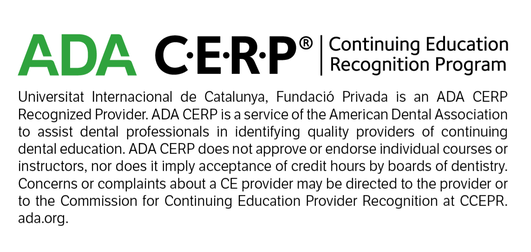Teeth with open apices: New strategies in apexogenesis and pulp regeneration.
Presentation
This course is intended for general dentists who seek to further their knowledge in the management of young permanent teeth, and in the use of biomaterials in the pulp treatment of these teeth.
Course objectives
- To learn in depth about the nature and characteristics of young permanent teeth.
- To study the most frequent etiologic factors.
- To understand the keys to accurate diagnosis in young permanent teeth
- To establish treatment goals.
- To know the recommended treatment for teeth with vital pulp
- To know the recommended treatment for teeth with non-vital pulp
- To analyse the characteristics and clinical management of biomaterials
Competences to be acquired by students
The student will be able to diagnose and treat young permanent teeth based on the approach of minimally invasive dentistry.
Prospective students
Holder of a bachelor’s degree in dentistry and/or stomatology.
Course Coordinator:
- Dr Karem Marfisi, Dr Francisco Guinot
Course programme
The course involves one lecture on the diagnosis and treatment of immature permanent teeth, as well as the characteristics and applications of bioceramics.
Students will explore pertinent clinical cases.
Students will gain hands-on experience to fully understand the clinical techniques associated with treating immature permanent teeth.
Theoretical part
Module 1
1. Definition and characteristics of immature permanent teeth:
- Anatomical characteristics
- Physiological characteristics
- Root formation
Module 2
1. Aetiology of pulp involvement:
- Traumatic dental injuries
- Cavities
- Malformation or hypoplasia
- Coronal root furrows
Module 3
1. Diagnostics in immature permanent dentition
- Anamnesis (history of pain)
- Clinical and complementary tests
- X-ray assessment
- Pulp exposure and bleeding
2. Factors that hinder diagnosis
Module 4
1. Treatment objectives
2. Factors that hinder treatment
Module 5
1. Vital pulp therapy (apexogenesis)
- Indirect pulp capping
- Selective caries removal, one-step technique
- Stepwise removal
- Direct pulp capping (Class I, Class II)
- Partial pulpotomy
- Full pulpotomy
- Pulpectomy
2. Vital pulp therapy
- Revascularisation
- Apexification
Module 6
1. Bioceramic cement
2. Ideal biomaterial properties
3. Composition
4. Clinical indications
Module 7
1. Presentation and discussion of clinical cases involving immature permanent teeth
Hands-on practice
Module 8
1. Vital pulp therapy:
We will discuss clinical cases step-by-step
Module 9
1. Partial pulpotomy/total pulpotomy. We will practice the steps involved in both techniques for extracting molars.
Module 10
1. Apexification: Access and biomechanical preparation of the root canal system. Handling bioceramic cements
Prerequisites & admissions
Prerequisites and admissions
-
The course is aimed at Graduates / Graduates in Dentistry or Stomatologists
